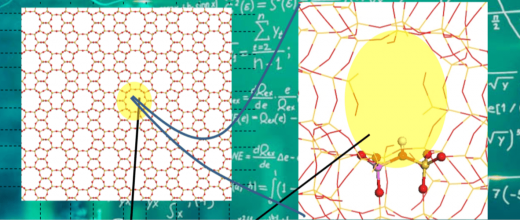15.12.2022
5 minutes of reading
The CARMEN joint research laboratory (JRL) was launched on March 1st, 2019, with a five-year mission to study porous solids, focusing on three classes of materials: zeolites, aluminas and clays, all of great interest for the energy transition. The laboratory experienced difficult birthing pangs due to the pandemic. Halfway through its planned lifespan, its core dynamics have been confirmed, with 2022 proving to be especially fruitful.
NEW METHODOLOGIES TO IMPROVE UNDERSTANDING OF POROUS MEDIA
Particular attention has been paid to numerous methodological developments and to the acquisition of new data that enhances our understanding of porous media, with an accent on their transport properties. Continuing the research done in previous years, experimental studies associated with complementary techniques, such as imaging and mathematical modelling, have added to our understanding of the morphology of these materials and the transport and surface properties at all relevant scales.
• For the study of soils, the laboratory teams recreated model soils comprised of clay and spherical silica, using a multi-scale/multi-technique approach to the analysis, and developed a narrow imaging methodology using X-ray and electron microscope techniques for a single object;
• Our understanding of zeolite materials has made significant progress, in particular thanks to developments in the modelling approach used in theoretical chemistry, very high field nuclear magnetic resonance and imaging using electron tomography and in-situ electron microscopy;
• Finally, an ambitious strategy involving correlative multi-scale characterization has led to an original description of the micro-structural textural properties of alumine. Part structure and part dynamic, the laboratory has developed a DLS-SAXS composition that simultaneously matches information about the structure of the porous medium and the particle dynamics, extracting different steps according to the concentration of boehmite suspensions. For the study of transport properties in this type of porous medium, NMRD and PFG-NMR techniques have also enabled the study of the dynamics of the solvent on the particle surface and at the agglomerate scale.
Video in French
CONFIDENCE AND RISK-TAKING: PEOPLE BEHIND INNOVATIVE RESEARCH
These results have been made possible through the mobilization of a team of 40 researchers from IFPEN, the Institute of Physics and Chemistry of Materials of Strasbourg (IPCMS), the PHENIX laboratory (Sorbonne University) and the Centre RMN à Très Haut champ in Lyon (CRMN - the Very High Field NMR Center), bringing together a wide range of skills in analytical science, modelling and mathematical analysis.
The CARMEN JRL has also welcomed a young international team of post-doctoral researchers, doctoral students and interns. In an interview as part of the CARMEN.EVOLUTION workshop to talk about their work, the young researchers praised the variety of the projects and discussed the scientific problems, the range of approaches and the different viewpoints of the international experts with industrial and academic backgrounds.
They all highlighted that the confidence they had been shown enabled them to take risks, which was an important factor in conducting breakthrough research and finding the innovative solutions needed for the energy transition.
Watch the interviews
>> Episode 1 : Sumit Mehan
>> Episode 2 : Alice Ducroix (In French)
>> Episode 3 : Sivagen Vydelingum
>> Episode 4 : Sharmin Sharna
>> Episode 5 : Thomas Jarrin (In French)
>> Episode 6 : Valentina Girelli - Consolaro
>> Episode 7 : Zhuoran Wang
>> Episode 8 : Nivedita Sudheer
RESEARCH TWICE-REWARDED
The benefits to the laboratory of their responses to the different challenges involved in fundamental research in the analytical sciences of modelling and signal processing have been recognized through the AXELERA Day awards, awarded by IFPEN’s Axelera competitiveness cluster, in the category “Collaboration or public / private partnership in environmental chemistry”.
Video in French
The laboratory has also received international recognition, obtaining the International Year of Basic Sciences for Sustainable Development (IYBSSD 2022) label for 2022, the year selected by the UN to highlight the importance of basic science in the achievement of the 2030 Agenda, with its 17 objectives for sustainable development.
CARMEN.EVOLUTION: A WORKSHOP FOR ESTABLISHING MILESTONES FOR THE MATERIALS OF THE FUTURE
The CARMEN JRL also represents a spirit of scientific sharing and influence within a community. With that in mind, the laboratory was the driving force behind the CARMEN.EVOLUTION workshop, held on June 21st and 22nd, 2022. The objective? To jointly define the scientific and social challenges involved in the development of new materials for energy, and to determine the strategies required to meet the challenges.


It is rare to see scientific meetings that bring together everyone involved in research on the topic in France. With 72 participants, CARMEN.EVOLUTION brought together scientists, financial institutions, French laboratories and representatives of the public authorities and major industrial groups for discussions on what is needed to stimulate public and private innovation and to identify the technical and scientific obstacles that must be overcome.
WHAT COMES NEXT?
“CARMEN has a magnificent future, and has already developed an EPIC-academic consortium. We have to take advantage of the best experts and approaches to characterization, wherever they may be!” declared Claire-Marie Pradier, Emeritus Research Director at the CNRS Institute of Chemistry, at the closing of the event.
Specifically, in the coming months CARMEN will be testing the robustness of the approaches that have been developed, in order to deploy them as closely as possible to technological applications of functional porous materials, while continuing to share its successes with the international scientific community.
scientific contact : Nathalie Schildknecht
You may also be interested in
CARMEN focuses on energy transition materials
To support the development of innovations for the energy transition, the CNRS, École Normale Supérieure Lyon, IFPEN, Sorbonne University, Claude Bernard








